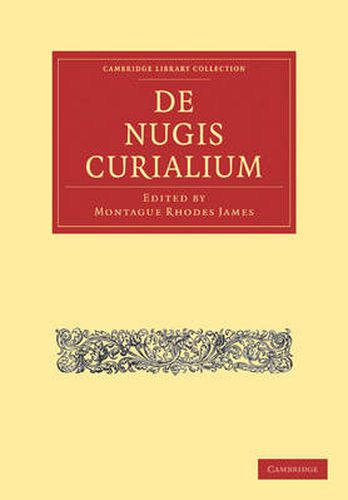Readings Newsletter
Become a Readings Member to make your shopping experience even easier.
Sign in or sign up for free!
You’re not far away from qualifying for FREE standard shipping within Australia
You’ve qualified for FREE standard shipping within Australia
The cart is loading…






Walter Map was a twelfth-century courtier and royal servant. He was a prolific writer, but De Nugis Curialium (‘Courtiers’ Trifles’) is the only surviving work confidently attributed to him. The book is a collection of short stories and anecdotes about the court, religion and history. Map’s references demonstrate that he read widely, not only biblical and theological works, but also classical authors such as Horace, Virgil, Ovid and Juvenal. The only surviving manuscript of the work is a fourteenth-century copy once belonging to the monk John Wells of Ramsey Abbey. The Cambridge bibliographer M. R. James would have been attracted to the breadth of Map’s referencing, and the author’s light-hearted writing style which was intended to entertain. James’ 1914 Oxford publication corrected the earlier work of Thomas Wright who published an edition for the Camden Society in 1850.
$9.00 standard shipping within Australia
FREE standard shipping within Australia for orders over $100.00
Express & International shipping calculated at checkout
Walter Map was a twelfth-century courtier and royal servant. He was a prolific writer, but De Nugis Curialium (‘Courtiers’ Trifles’) is the only surviving work confidently attributed to him. The book is a collection of short stories and anecdotes about the court, religion and history. Map’s references demonstrate that he read widely, not only biblical and theological works, but also classical authors such as Horace, Virgil, Ovid and Juvenal. The only surviving manuscript of the work is a fourteenth-century copy once belonging to the monk John Wells of Ramsey Abbey. The Cambridge bibliographer M. R. James would have been attracted to the breadth of Map’s referencing, and the author’s light-hearted writing style which was intended to entertain. James’ 1914 Oxford publication corrected the earlier work of Thomas Wright who published an edition for the Camden Society in 1850.